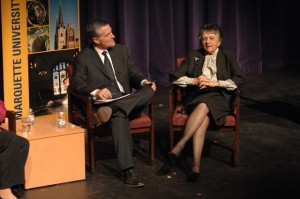Women Are Still Relatively New in the Legal Profession
Recent posts by Judi McMullen and Melissa Greipp have focused on issues confronted by women in the legal profession today, and the current issue of the National Law Journal reports that in large law firms, women still account for just of 15% of equity partners.
Although women currently (as of 2011) make up 31% of all lawyers in the United States and 47% of all students at ABA-accredited law schools, the presence of large number of women in the profession is still a relatively recent phenomenon.
There have been women in the American legal profession since the 1870’s, but their numbers were miniscule until after 1945.
In the fall of 1947, women accounted for only 3.3% of law students. (The number, not surprisingly had been higher during World War II, but that was because of the dramatic drop in the number of male law students during the war.) Although the percentage declined to 2.8% in 1948 and 1949, it began to grow after that and actually reached 4.1% (1362 of 31,197) in 1952, when 4.9% of all first year law students were women.
However, the number (not just the percentage) of woman attending law school began to decline again after 1952, as traditional notions of gender-appropriate occupations were reasserted during the Cold War Era. By 1956, the percentage of women dropped to a post-1950 low of 3.0%.
Although the number increased after that, the increase was extremely modest, and the 1952 figure of 4.9% of all law students was not reached again until 1968. Although the number of female law students increased from 1061 in 1956, to 2759 in 1967, the number of male students grew from 34,177 to 58,315 during the same period.
It was in the fall of 1968 that law school enrollments first reflected the impact of the Women’s Movement. For the 1968-69 academic year, the number of female first year law students jumped from 1179 to 1742, and the percentage of all law students who were female hopped up to 6.0%. Significantly, for the first time in the decade of the 1960’s, the number of males entering law school actually declined as an absolute number between 1967 and 1968.
The number of female students increased dramatically after that, passing the “10% of all law students” mark in 1972, the 20% barrier in 1974; and the 30% level in 1978. The largest single-year jump (in percentage terms) came between 1972 and 1973, when the number of first year female law students rose from 15.7% to 20.2% of the total, and the overall number of female law student rose from 12.1% to 16.0%. (Also, in 1972, the last all-male law school, Washington and Lee, first opened it doors to female students.)
The number of women in law school as a percentage of the whole continued to increase after 1978, although the rate of increase slowed. In 1985, women made up 40% of all law students for the first time; and in 1987, the percentage went permanently over that mark.
The percentage of women peaked at 49.0% in 2001 and 2002, and has declined slightly over the course of the past decade. During the 2011-12 academic year, women made up 46.7% of law students.
There were female students at the Milwaukee Law School in the 1890’s, and when Marquette took over the Milwaukee Law School in 1908, there were several women in the evening law program. Unfortunately, the law school does not have records of the number of female law students in its student body in individual years, but those figures could be reconstructed from the records of the University Registrar. However, the existing evidence suggests that Marquette’s pattern has generally tracked that of other ABA accredited law schools.
Note: All of the statements above that refer to “law schools,” refer actually refer only to ABA-accredited law schools. Outside of California, the vast majority of American law schools are ABA-accredited. In 1947, the number of ABA-accredited law schools was 111; by 2011, it was 201.


